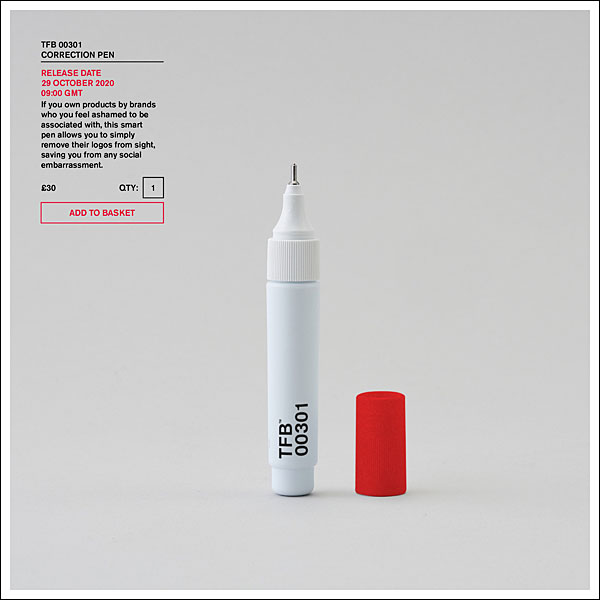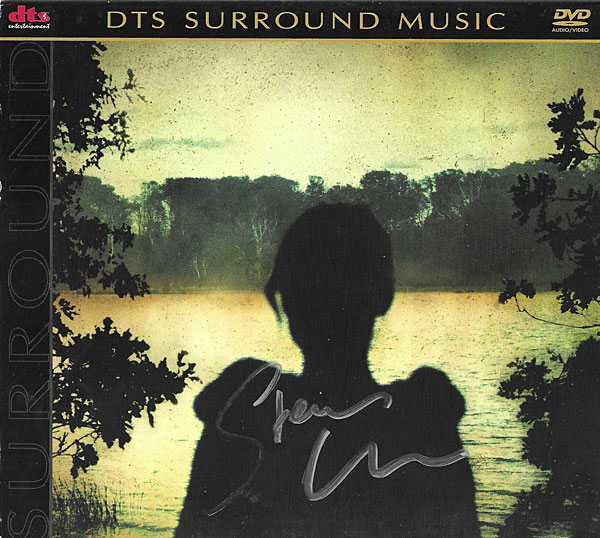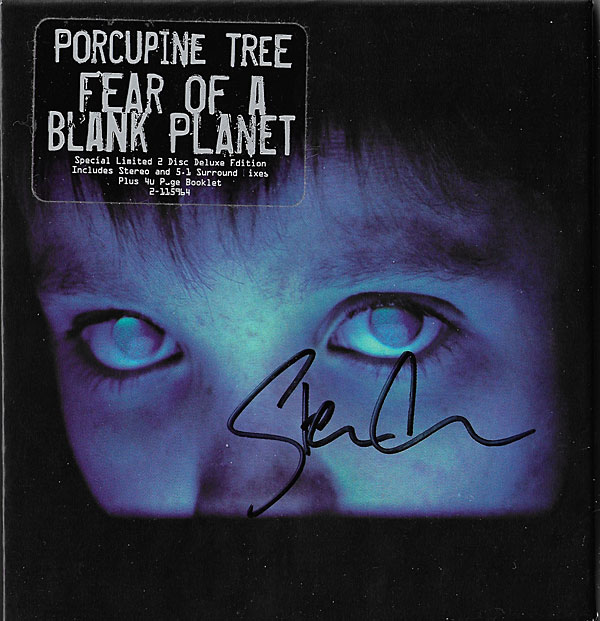I'm happily spinning along on the bike listening to the new album, when Elton/Alexa's voice came on in Personal Shopper, and I was on Amazon in a second. They obviously knew I was coming and put a steep discount on the Beatles' Abbey Road box with the Atmos mix. Steven's bluray arrives next week and then the Beatles the week after. I blame all of you, but Elton most of all.
Steven Wilson Is a Hi-Res Man of the People Page 2
Mettler: And she's still on there at the very end of "Personal Shopper," right?
Wilson: Yeah, she's still at the end. She speaks the words that didn't really work for Elton, because he wouldn't say, "mobile phone skins." (Says in mock Elton John voice), "I never had a mobile phone, so I don't need that sh--!" (both laugh)
Mettler: I love the way he says "Multivitamin supplements" in the proper British pronunciation of the word, instead of the American version. [MM notes: Elton pronounces it as "vitta-min," not "vyta-min."] How did you get Sir Elton to do this for you? What was the process of getting him involved?
Wilson: I always had this idea it would be someone with a very well-known voice who would be the one to speak those items. But I didn't really know exactly who for a long time—I thought maybe it would be an actress or an actor.
And then I went to see Rocketman [the acclaimed 2019 Elton John biopic; read my review of it here]. And right at the end of Rocketman, there's a little bit just before the credits where it says, "Elton has now kicked all of his addictions, with the exception of one." And then, of course, they throw out the picture of him shopping, and it was like a light went off—BING! "Of course! This is the guy that has to do it. Failure is not an option. I have to get him on it." He's the most famous consumer on earth, right? And I managed to get the track to him through a friend of mine who used to manage him.
Mettler: Was it Merck Mercuriadis? [MM notes: Merck is a longtime music industry executive who's also known as the founder of the Hipgnosis Songs Fund, a music IP investment and song management company.]
Wilson: Oh, you know Merck? So, yeah, I get the track to him through Merck, and the next day, I got a message from Merck saying, "Elton's calling you in 10 minutes." And I was like (exclaims), "Wow! Oh my God! That's extraordinary!"
Sure enough, I get a phone call 10 minutes later. It's, "someone's calling you from Nice in the South of France," so it's gotta be him. Yeah, I'm really excited at this point. I pick it up and I hear this voice go, "Hello, Steven. This is Elton John. I F---ING love your track! Let's do it!" And, of course, it was one of the greatest moments of my career. One of my heroes is ringing me up, and he's raving about my track—and he gets it! In a sense, this sequence is like he's sending himself up, in a way.
Mettler: He's very self-aware about that, which just makes it even more perfect. You really couldn't have anybody else doing it.
Wilson: But I'm also sending myself up too, because if you look at that list, with things like "Deluxe Edition box sets" and "180-gram vinyl reissues"—I mean, anyone who knows anything about me knows this is my world! So, I'm sending myself up too. It's supposed to be a funny thing. It's supposed to make you laugh when you hear Elton John say, "Sunglasses." It's supposed to be fun, and I do hope people take it in that way.
Mettler: It's very fun, I agree. You've also got The London Session Orchestra on a couple of tracks here, and that's really something to hear in Atmos. Like on "Anyone But Me," the final track, where the second half of it sounds like the biggest soundstage we've gotten from you to date.
Wilson: There are a lot of very lush moments on the record. There are a lot of vocals and backing vocals on there too, on songs like "Self" and "Personal Shopper." You can imagine that was a lot of fun to play with in Atmos and surround too.

It's funny. It's an album which, in some ways, is quite minimal in some respects—in the sense that, for a song like "King Ghost," the sound palette is quite small. It's basically a few analog synth arpeggiators, a drum machine, vocals, and a tiny little bit of percussion. That's all there is to it, really—but it sounds so emotionally engaging, and so lush.
And it sounds beautiful in surround because there isn't a lot of stuff going on. Sometimes I find the best surround mixes are the mixes where you're not fighting to find a space for everything. You've just got eight or nine elements, and you're able to position them very discretely so everyone can hear exactly what is coming out of each part of the mix. "King Ghost" is a good example of a track like that. It just sounds glorious in surround.
Mettler: To me, "Man of the People" is another one of those tracks too, because it's also very minimalist. I'm going to say it has a "spirits in the ethereal world" kind of feel, where you're just floating literally all around us in that space.
Wilson: Right. Yeah, I love that track so much. It's so beautiful. I always had this idea—this is obviously notwithstanding what I said earlier about trying not to do homages to other things. (chuckles) For that track, I always wanted to do something like Marvin Gaye meets Pink Floyd—something with a really soulful kind of sound to it with a simple drum machine kind of backing, but at the same time with a Floydian sense of texture and space. Of course, I'm not comparing myself for one minute to any of those artists.
Mettler: Not at all. Just like we were saying earlier, these are touchstones that filter into where it turns into your thing. That's what you do.
Wilson: Right, exactly. Yeah. It was a concept in the back of my mind: What would it sound like if Marvin Gaye's "Sexual Healing" had been recorded by Pink Floyd? (both laugh) And we ended up with "Man of the People," which I'm so proud of.
Mettler: As you should be! Now, on "Follower," can I ascribe that verbalized word section to being your own kind of "Siberian Khatru" moment? Is it ok to equate those two word lists together like that, if you will? [MM notes: "Siberian Khatru" is the second and final track on Side 2 of Yes' September 1972 magnum opus, Close to the Edge, which Wilson mixed masterfully in 5.1 on Blu-ray in 2016, and it contains an infamous section of singular words sung/recited by vocalist Jon Anderson in its back half.]
Wilson: Interesting! That's interesting, because I can see why you say that—but it's never occurred to me. You're the first person to mention it, but I completely can see why you would say that. Yeah, the (Wilson hums the parallel verbal melody) "dunn, dunn" . . . Yeah, I can see that! I can see that.
Well, you know, there you go. There's an example that wasn't conscious. But obviously, that's a record and a band that are ingrained in my DNA, so that's very interesting you spotted it.
Mettler: It's one of those things we hear that you don't hear there yourself. And in Atmos, you've elevated those vocals in the upper plane.
Wilson: They're pretty immersed and are very immersive, sure, yeah.

Mettler: Earlier, you said you did some other mixes in Atmos. Is there anything you're allowed to talk about yet?
Wilson: Well, the Crimson's come out. [Wilson is referring to The Complete 1969 Recordings, the 26-disc, limited edition 50th anniversary box set released in August 2020 to commemorate King Crimson's seminal October 1969 debut, In the Court of the Crimson King.]
Mettler: Right. I'm still waiting to get my hands on a copy of that, but based on what you were just saying about Atmos—to me, a minimalist song like "I Talk to the Wind" must be something really fantastic in Atmos, yes?
Wilson: Exactly, yeah. For that song, I've got the woodwinds, a lot of flutes, and other stuff elevated, and it just sounds—and obviously, it's the obvious word I can use, but it's the only word I can use—it sounds so spacious. Literally, you can almost touch the different sounds around you.
I've also done a bunch of Atmos mixes for Gentle Giant, because we're mixing three more of their albums for release in the year ahead. [Co-founding GG bassist and noted record producer] Ray Shulman said to me, "Listen, can you do Atmos?" And I said, "Yeah, I'd love to, if you're into it." So, they're going to put those Atmos mixes on those Gentle Giant reissues.
Mettler: And these are all new releases, right? You've already done a few Gentle Giant 5.1s on Blu-ray before for [December 1972's] Octopus and [September 1974's] The Power and The Glory. [Wilson also did 5.1 mixes on Blu-ray for the September 2017 GG compilation set titled Three Piece Suite.]
Wilson: Right, these are all new. I've done three albums—[August 1975's] Free Hand, [April 1976's] Interview, and [August 1977's] The Missing Piece. They're all great records. [MM notes: Though these three Gentle Giant 5.1 mixes have been completed and have been discussed elsewhere both online and in print, their release dates have not been officially scheduled as of presstime.]
The other ones that I've done, Mike, unfortunately, I can't go on the record with yet.
Mettler: Can you say off the record? We won't print it.
Wilson: Ok, well, here's . . . [MM notes: The ensuing three minutes of this conversation have been duly redacted until what we discussed here is officially announced.]
Mettler: Now that you've got the "Atmos itch," as I'm calling it, would you go back and revisit your catalog—as in, revisit the Porcupine Tree catalog, or do your own solo work in Atmos?
Wilson: I . . . (slight pause) I don't think so. I don't think so. I mean, firstly, it's a lot of work. Obviously, the fact that The Beatles have done it makes a big difference, which is great in terms of opening up the market. But I definitely will do everything going forward in Atmos now, yeah.
Mettler: Ok. Well, how about your Atmos wishlist, then? I liked the In Absentia box set that came out in February 2020, where you had some surround revisitation on Blu-ray there. [In Absentia was initially released in stereo on CD and vinyl in September 2002, with an ensuing DVD-Audio release in 5.1 in March 2004.] I think that opened up the palette even more for us possibly getting a Dolby Atmos upgrade from you there.
Wilson: I think if there was a big reissue project, maybe I would go back and do an Atmos mix. But I'm not going to make it a point of doing everything [from my catalog] in Atmos now.

Mettler: I hear you. But it seems to me [March 2005's] Deadwing is just sitting there as something they might come to you and say, "Would you do a big Atmos thing for this album?" I mean, getting "Halo" in Atmos—how can you not want to do that?
Wilson: Yeah, that one might be one to do, although that was originally done by Elliot Scheiner in 5.1 [for Deadwing's concurrent DVD-Audio release].
Mettler: True—so now we've got a viable option here, because we can say you didn't technically do that Deadwing surround mix entirely by yourself.

Wilson: I'm not even sure if I've got the files—the original 5.1 mix files. But [April 2007's] Fear of a Blank Planet I could do. Well, we'll see—if there are any big reissue projects, then I might certainly consider doing them in Atmos.
If any of those labels that have 5.1 mixes I've done over the years come back to me and said they want to do, for example, [Yes' aforementioned] Close to the Edge in Atmos—great! Bring it on. I'd love to do it.
Mettler: Sold! Atmos is an optimal idea for Close to the Edge, in my mind. You know, I was talking to Jakko Jakszyk recently, and he said you guys used to live close to each other and would go to lunch every now and then and talk shop. Do I have that right?
Wilson: Yeah. Yeah, you do. We still don't live that far away from each other. I've moved back to London, but he's still only 30 minutes away. Yeah, Jakko's great, and Jakko is very passionate about immersive surround audio too. I'd love to try and get him into Atmos, actually.
Mettler: I'll second that. The 5.1 mix he did for Secrets & Lies, his solo record that came out last October, would be Atmos-ready because it's very atmospheric. Now, he also kind of joked to me about something else, and you can confirm or not confirm it. He did some of Ian Anderson's solo material in 5.1 [like April 2014's Homo Erracticus] and was possibly going to do some Jethro Tull remixes after you had done the bulk of their 5.1 catalog yourself. He'd already remixed some of their live material. But he said you may be doing some more Tull now because, well, you have the time to do it. Is that true? Are you doing more Tull in 5.1?
Wilson: Well, I've done [August 1980's] A for them, yeah. Umm, in my defense, I didn't know at the time Jakko was in the running to do it. But basically, I had more time because of lockdown, and I told them, "Look, I'm available now if you still want me to do it"—and they asked me to do it. They didn't tell me about Jakko—but anyway, cut a long story short, I did a couple of things during lockdown I didn't think I was going to have the time to do originally, but obviously I did have the time because of the lockdown scenario.
I had told them I was done with the Tull catalog because I thought I was going to be too busy with The Future Bites. As the lockdown transpired, I had a year to do a lot more stuff I didn't think I was going to have the time for doing—and A was one of them.
Mettler: A is a weird album in the Jethro Tull catalog. It's like a bridge between two universes, and it seems to me like it's a transitional record. Were you very familiar with A, or not much at all, growing up?
Wilson: Not much at all—which is another reason why I originally said I shouldn't be doing it, because I always feel like I want to know the record pretty well before I do it. But I got into it, and I think you're right. It's a transitional record. The incorporation of electronic elements into it isn't wholly successful, I don't think, but you can see more of a new way of doing Tull things. I still feel there are some great songs on it, and Ian [Anderson] is such a great writer.
Mettler: I agree, and I think it's worth a revisit. Listening to it in 5.1 is probably the only way I'd go back to that record, to be honest. Now, I don't know if you're doing [April 1982's] The Broadsword and the Beast or [September 1987's] Crest of a Knave, which are two of Tull's prime '80s records. Is that something on your slate, or have you not thought about doing those albums yet?
Wilson: I've not been asked. I've not been asked, so I can't tell you at the moment. But I think what's nice about A is I've made a big difference to it sonically, if I can say so myself. When I do a new mix, the stereo is obviously the first part of the process, and with certain records, I've made a difference for the better—and I think A is one of them. The original mix was quite subdued in a way, so even in stereo, I think it really pops better now.
Mettler: Well, I'm looking forward to hearing what you've done with it in stereo and in 5.1. To wrap things up, I feel like you came up with the perfect video to go along with "Personal Shopper." It's a very interesting visual view of collective consumerism where everybody wants to be in a store or a mall during this uncertain time of ours—though you really can't do that in good conscience, or you'll face the consequences.
Wilson: Yeah. And like I've said, I'm halfway between thinking of that song as a love letter to consumerism, and the other half of me is thinking of it as dealing with the more insidious side of consumerism.
The insidious side of consumerism for me is when companies like Amazon and whoever else it is use these algorithms to analyze our online footprint and then use that data against us, you know? You suddenly get spam in your inbox with special offers "reduced for today only," or "people who bought this also bought that." I was worrying about that. In a way, what's most worrying about that to me is this technology is still in its very infancy. These people are only going to get cleverer and more powerful analyzing our data, and using it against us.
Mettler: Sometimes, you have a thought about something you didn't even verbalize or write down, and then for some reason it shows up on your social media pages. And you're like, "Wait a minute. I didn't even say that! I didn't type it into anything. How did that happen?" I don't know that I want to think too hard about it.
Wilson: Exactly! Or you've been having a conversation with your best friend about something on your phone. You've been talking about a holiday destination, and suddenly you get a spam email about it—that stuff is really scary. Really scary.
Mettler: That's like Alexa. I had gotten one but then decided not to use it, because that gets you right into it with them knowing literally everything that's going on. They can already tap into you whether you've got it, quote, unquote, "active," or not. I don't think I want that.
Wilson: Absolutely. And that's what scares me. Yeah—The Future Bites, Mike. The Future Bites.
- Log in or register to post comments



...On a great in-depth interview. It's always good to get an update on Steven's outlook on his music and new projects. Now I also have to hunt down Tull's A - I don't remember ever hearing it, or if I did, it's so far in the past that I need to give it another go.

Steven is surround God and I just wish an even longer, more detailed interview about his Atmos mixing, the gear he's using for Atmos mixes, etc...Picture of his Atmos studio would be also nice. Also, it would be fun to have his own albums in Atmos, but if I'm honest, his albums in "only" 5.1 sounds way better than 95% of other Atmos music mixes (on Tidal...). They're just bloody perfect! Now I need to go buy the Future Bites on Blu-Ray , because the album is available "only" in DD+/Atmos on Tidal and album like this deserves full blown TrueHD Atmos of course :)

Atmos is a metadata it doesn't care how it was delivered, the resulting mix is the same. The issue that Tidal and Dolby "created" is that they encode it too soft, namely the dialnorm offset is to low at an average -13db which forces the listener to turn up the MV way higher than normal to achieve the same loudness one normally listens to with other media. However this doesn't create any real technical problems and certainly won't affect the mix itself. I listened TFB on Tidal in Atmos and it was very good mix wise, on par with his other stuff. My BD copy should be here soon too, so I can make my own comparison but unlike you I won't expect any major differences other then @10db on the MV dial.

Yes this album is a major turn and not for the better. It doesn't mean that changes are bad, he's been doing lots of different stuff over the years, and some where good some were not so good. To me the real silly stuff was the "neo disco" vocals and rhythms. While as an album or concept works ok but as each track on their own have very little to offer musically. I'm surprised this didn't come up in the interview but apparently Wilson thinks Guitar centric Rock music is dying like Jazz was after Rock came about, and Urban type music or any as such with heavy electronics will replace it. I think it's already happening to some extent, and that's why I was surprised he went to that direction in his 50's. Maybe he's more Bowie than he realizes.

























































